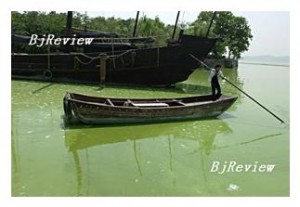"When my remote friends ask me on the Internet, 'is this the same lake that you Wuxi people have been proud of' I just don't know what to say," said a Chinese college student with the English name Jimmy, from Wuxi, a scenic city renowned for the beautiful Taihu Lake.
Algae bloom that damaged the water supplies of millions was an alarm call for local government officials
By JING XIAOLEI
UPDATED: June-21-2007 ( Beijing Review NO. 26 JUN.28, 2007)
On May 30, Wuxi city's famous landmark was hit by a sudden bloom of blue-green algae, which affected the main water supply for millions of people, making tap water putrid and unpleasant to drink.
Shop shelves were emptied of bottled water overnight by panicked customers and the price of an 18-liter bottle sold by street peddlers rose from 8 yuan to 50 yuan in a single day.
Blue-green algae occurs naturally in rivers, lakes and damp soil. "Bloom" is the common term used to describe an increase in the number of algal cells to a point where they can discolor water, form scum, produce unpleasant tastes and odors, affect shellfish and fish populations or otherwise create a nuisance and seriously damage water quality.
This summer's unusually hot weather could be the reason for the sudden algae bloom. The water level of Taihu is at its lowest in 50 years due to continuous high temperatures and a lack of rain, which have caused an excess of nutrients in the water that may have stimulated algae growth.
The pollution incident drew wide attention. China's main environmental protection body, the State Environmental Protection Administration (SEPA), vowed to close all factories that were discharging pollutants into Taihu as a step toward controlling the situation.
"The bloom of blue-green algae was caused by natural factors and serious man-made pollution," said Zhang Lijun, Vice Minister of SEPA, at a press conference on June 5 in Beijing.
According to Zhang, the content of nitrogen in the lake in 2006 tripled that of 1996, while the content of phosphate pollutants had increased by 150 percent.
The SEPA set out to investigate all enterprises releasing nitrogen and phosphate pollutants in the area. Those exceeding emission standards would be shut down, and production restrictions would be imposed on the rest according to the lake's water quality.
The city government also took action to solve the water crisis, including artificially inducing rain to dilute the lake water, and the provincial government diverted water from the Yangtze River to the lake. Local authorities also began to monitor supplies of the bottled water in 10 supermarkets and had more bottled water brought in from neighboring regions.
Zhang blamed industrial and household sewage and the excessive use of fertilizers as the major sources of pollutants in water. He said the government should implement stricter pollutant discharge standards for industries, upgrade sewage treatment facilities and control the use of chemical fertilizers.
"Environmental pollution is not a natural disaster; it is created by humans' unsustainable production processes and lifestyles," Ma Jun, Director of the Institute of Public and Environmental Affairs and an environmental consultant for Sinosphere Corp. commented on the Taihu incident.
In addressing the water pollution event, SEPA ordered the Jiangsu Provincial Government to ban the construction of new factories discharging nitrogen and phosphate pollutants.
Four days after a series of countermeasures were taken to tackle the algae problem local health authorities announced that the quality of water from all tap water companies in Wuxi met the standard for drinking water.
However, for a while the urban residents of Wuxi, with a population of 2 million, continued to depend on bottled water for cooking and drinking as polluted water remained in transmission pipes.
Experts succeeded in dispelling the stench produced by the blue-green algae at Taihu with potassium permanganate, an oxidant. Workers also added active carbon powder at treatment plants.
Five local officials in Wuxi were punished for their neglect of duty in stopping enterprises from dumping polluted water into the lake even after the breakout of the water crisis.
"It is not the first time that drinking water in the region has taken on a strange odor, and similar incidents have happened all over China. But the Wuxi incident clearly demonstrates a conflict between China's development and environmental protection," Ma noted.
The water crisis taught the government a lesson. In a special meeting held recently in Wuxi, Yang Weize, Secretary of the Wuxi Municipal Committee of the Communist Party of China emphasized that the city would never allow economic development at the cost of environmental deterioration.
According to Vice Minister Zhang, the city faces a risk of further algae blooms in the future, so the local government should create an emergency response plan.

